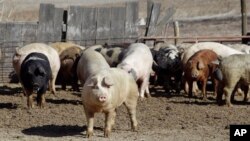China has increased import duties up to 25 percent on a list of U.S. goods, including pork, fruit and other products, amounting to $3 billion.
The tariffs, which took effect immediately on April 2, were announced late Sunday by China's finance ministry, who said the country was responding to a U.S. tariff hike on steel and aluminum that took effect on March 23.
China's Ministry of Commerce said in a statement Monday it was suspending its obligations to the World Trade Organization (WTO) to reduce tariffs on 120 U.S. goods, including fruit and ethanol. The import duties on those products will be raised by an extra 15 percent.
The retaliatory tariffs come as the trade tensions between Beijing and Washington escalate.
Economic observers said the immediate impact should be limited, but investors have feared a full-blown trade spat between the two countries may depress global commerce and subsequently be damaging for world growth.
Even if China's tariffs don't have a huge impact on America's $20 trillion economy, they will bring pain to specific communities.
"It's hard to say exactly how this will impact U.S. pork producers. We export pork to more than 100 countries around the word," Jim Heimerl, president of the National Pork Producers Council, told VOA. "We are the most competitive pork-producing nation in the word. We produce the highest quality, the safest, and the most affordable pork in the world. And when we can compete on a level playing field, we do very, very well. Obviously, with a 25 percent tariff in China, we are at a very significant disadvantage."
Heimerl said China was a particularly significant market for the U.S.
"It was our No. 2 U.S. pork export market. Last year, we sent $1.1 billion worth of pork to China, and that's out of a total of nearly $6.5 billion of U.S. pork exports. That's a significant share of our export market," he said.
Concern over the tariffs was also felt by much smaller businesses such as the Yao Family Wines of St. Helena in Napa Valley, California. Thomas Hinde, president of the winery, said although they sell very little of their wine in China, he is concerned that the extra 15 percent tariff on U.S. wine will slow down their effort to develop that market.
"Largely half of the wine consumed in China are from France. France pays the 42 percent duty now, but they won't have the additional 15 percent," he said.
In the meantime, U.S. President Donald Trump is preparing to also impose tariffs on more than $50 billion worth of Chinese goods. The move is intended to punish Beijing over U.S. accusations that China has systematically misappropriated American intellectual property. Beijing has repeatedly denied such allegations.
Beibei Su and Teng Xu of VOA's Mandarin Service contributed to this report.






